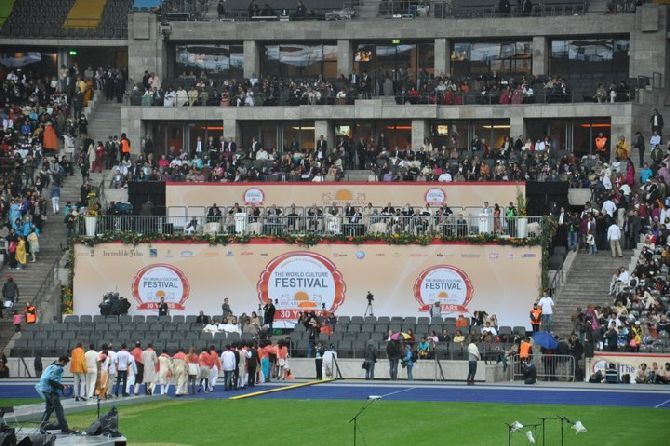 | « Back to article | Print this article |

There will remain those who will remain in opposition to this massive endeavour for world peace with an aim not to improve, but to scuttle the project.
But for the rest of us, a cultural and spiritual event of this significance and scale is a feast for the mind and soul, says Sankrant Sanu.
Five years ago, I was at the Olympiastadion in Berlin, Germany, once the site of Hitler's controversial 1936 Olympics. Ballet dancers from Russia performed a segment from Tchaikovsky's Swan Lake, drummers from Africa led a mass ensemble, and a band from Argentina had the audience up on their feet dancing to Sanskrit chants set to rock music, 500 Polish dancers enthralled, matched by an even bigger set of 2,000 Bulgarians who trod light and swift their folk dancing traditions.
Over 25,000 people meditated together at the World Culture Festival in 2011, helping erase the ghosts of the stadium's past. Wouldn't it be nice if, once in a while, rather than travelling to see the world, the world travelled to us, bringing the delights of their own unique cultures?
The World Culture Festival 2016 in Delhi promises just that on an enormous scale, with 3.5 million expected attendees. But its impact may transcend mere song and dance.
If you see the list of the largest gathering of people, (external link) most of the events are specific to particular religious traditions.
The biggest ever was the Kumbh Mela of 2013 where 30 million people took a dip in the Ganga. Other events include the gathering for the Arba'’eeen at Karbala, or the attendance for the Pope in the Philippines, with Rod Stewart's mega concert in Rio De Janeiro with over 4 million people being an odd one out.
The World Culture Festival is unique as a multi-religious, multi-cultural, multi-performer gathering -- a modern Kumbh Mela, as it were. It creates a new tradition in a world smaller than ever before and yet precariously placed in conflict.
With much talk of tolerance and diversity, religious conflict and nationalistic and ethnic rivalries remain contemporary challenges. Isn't it time we actually celebrated diversity rather than merely 'tolerated' it?
In the Berlin festival there were Jewish, Muslim and Christian leaders, along with those of the Indian traditions addressing the gathering. There were political leaders from across the world. There were diverse nations and cultures, yet united by something we all possess and need; a yoga, union, of the bodies, mind, and breath.
But in a world where LuLuLemon's yoga pants are the hot fashion accessory and Disney's Kung Fu Panda learns the joys and travails of 'inner peace,' does meditation, the practice of the mind, matter? Yes, numerous studies are being published on the benefits of meditation in reducing stress, alleviating depression and improving health for individuals.
Harvard researchers suggest it may literally Build a Better Brain (external link), for instance. Research into yogic breathing practices, such as Sudarshan Kriya (external link) showed it to be as effective as medication for treating depression, without any of the associated side effects.
So meditation works for an individual, but will it when people meditate in a large group? Here the research gets more controversial and thus more interesting.
In the summer of 1993, a group of 4,000 Transcendental Meditation practitioners assembled in Washington, DC, for an experiment. According to a report (external link), the hypothesis was that 'levels of violent crime in the District of Columbia would fall substantially during the Demonstration Project was posited with a 27 member Project Review Board comprising independent scientists and leading citizens.'
The DC Metropolitan Police Department provided the crime data. 'The study statistically controlled for the effects of weather variables, daylight, historical crime trends and annual patterns in the District of Columbia, as well as trends in neighboring cities.'
The report concluded the crime dropped by up to 23 per cent, accounting for various controls 'coincident with the peak number of participants in the group during the final week of the assembly.'
Research on the effects of collective meditation is still preliminary, which makes its exploration even more fruitful. If 4,000 meditators could affect the crime rate in a city, what could 3.5 million people meditating together do?
Delhi has been the crossroads of empires and the centre of intrigues. It has been the seat of power and, with power, the den of corruption. It will be intriguing to watch and study what changes an event like the WCF could bring to the Lutyens ecosystem and beyond.
Any change brings resistance. If you face no opposition, it is unlikely that you are doing anything of significance. Celebrating diversity troubles those that want to convert all humans to one religion, for instance. Other groups, such as NGO Swechha, have raised concerns about the impact on the environment of the Yamuna. The impact of such a huge gathering of people would certainly need to be well-managed.
To its credit, the Art of Living organisation has a stellar record on environment. In 2010, it had launched a Yamuna cleaning project (external link) called 'Meri Dilli, Meri Yamuna' to raise awareness about pollutants flowing into the river and to clean the ghats. It has also worked for river revival (external link) such as the Kumudavati river near Bengaluru. Nevertheless, it should remain open to constructive suggestions from environmental groups on specific inputs for managing the impact.
There will remain those, though, who will remain in opposition to this massive endeavour for world peace with an aim not to improve, but to scuttle the project. Delhi's ghosts have even a longer history than Berlin's. They may not yield their grip so easily.
But for the rest of us, a cultural and spiritual event of this significance and scale is a feast for the mind and soul.
If Berlin with 25,000 people blew my socks away, what will 3.5 million do? I look forward to finding out.